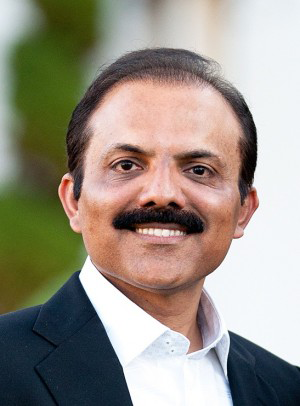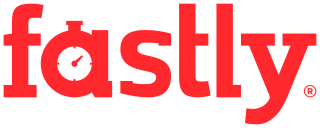
A content delivery network or content distribution network (CDN) is a geographically distributed network of proxy servers and their data centers. The goal is to provide high availability and performance by distributing the service spatially relative to end users. CDNs came into existence in the late 1990s as a means for alleviating the performance bottlenecks of the Internet as the Internet was starting to become a mission-critical medium for people and enterprises. Since then, CDNs have grown to serve a large portion of the Internet content today, including web objects, downloadable objects, applications, live streaming media, on-demand streaming media, and social media sites.

F5, Inc. is an American technology company specializing in application security, multi-cloud management, online fraud prevention, application delivery networking (ADN), application availability & performance, network security, and access & authorization.
Speedera Networks, founded in 1999, was a content delivery network (CDN) company that emerged in the late 1990s to advance technology applications for Internet communications and collaboration and became the first CDN to turn a profit. On June, 2005, Akamai acquired Speedera Networks.

Edgio, Inc., evolved from Limelight Networks, a 20-year provider content delivery services to stream digital content over the internet. Following a 2022 acquisition of Edgecast, the company re-branded as Edgio and has grown to offer a full suite of edge-enabled applications that run on the company's globally scaled network. These applications include video workflow and automation, website acceleration, and cyber security. As of January 2023, the company's network has more than 300 points-of-presence and delivers with 250+ terabits per second of egress capacity across the globe.
Ben R. Neumann was an American entrepreneur, investor, film producer and mixed martial artist, best known for founding early Internet hosting service Internet Communication Icom.com, and his subsequent investments into companies such as iBoost.com, Globat.com, FatCow.com and his work in the motion picture industry. Some of Ben's more recent ventures were the content delivery networks NetDNA, MaxCDN and HDDN, which he co-founded together with business partner and protégé Chris Ueland in October 2009. In 2011, through his consulting firm Innovative Currency, Ben ventured outside the technology field and created his unique coaching programs InspireMoreHeroes and MillionairesMentor. He helped others with his innovative way of marketing and creating leads.

Highwinds Network Group, Inc. (Highwinds) was a company founded in 2002 that offered IP services including content delivery network (CDN), cloud storage, IP transit, transport and colocation. The company headquarters were located in Winter Park, Florida, United States. Highwinds maintained Network Operations Centers (NOCs) in Winter Park, FL, Phoenix, AZ, and Amsterdam, Netherlands as well as offices in Costa Mesa, CA, São Paulo, Brazil and London, England. The Highwinds network, called RollingThunder, consisted of more than 70 points of presence throughout North America, South America, Europe, Asia and Australia. Highwinds provided video streaming services to media companies including Blip.TV and Hudl, delivered online games for publishers such as Valve and CCP Games and distributed advertising assets for leading platforms including Facebook's LiveRail.
The deployment of IPv6, the latest version of the Internet Protocol (IP), has been in progress since the mid-2000s. IPv6 was designed as the successor protocol for IPv4 with an expanded addressing space. IPv4, which has been in use since 1982, is in the final stages of exhausting its unallocated address space, but still carries most Internet traffic.
CacheFly is a content delivery network (CDN) provider based in Chicago, Illinois with a 100% remote team. In 1999 CacheFly started as Downloadhosting.com for file distribution for small software developers, by CTO, Matt Levine.

Cotendo, Inc. is a content delivery network and an application delivery network service provider. The company's headquarters is in Sunnyvale, California, with research and development based in Netanya, Israel. In March 2012, Akamai acquired Cotendo for over US$300 million.
Edgecast Networks, Inc. was a subsidiary of Yahoo! Inc. and provider of content delivery network (CDN) and video streaming services. Founded in 2006, it was notable for being a self-provisioning CDN technology used by the telecommunication and hosting industries.

Ajit Gupta was a Silicon-Valley based entrepreneur and the founder of Aryaka, AAyuja, JantaKhoj, and Speedera Networks. He holds 21 technology patents for Internet content delivery and global traffic management. Ajit Gupta graduated from Indian Institute of Technology Roorkee in Electrical Engineering Batch of 1984.
Dynamic Adaptive Streaming over HTTP (DASH), also known as MPEG-DASH, is an adaptive bitrate streaming technique that enables high quality streaming of media content over the Internet delivered from conventional HTTP web servers. Similar to Apple's HTTP Live Streaming (HLS) solution, MPEG-DASH works by breaking the content into a sequence of small segments, which are served over HTTP. An early HTTP web server based streaming system called SProxy was developed and deployed in the Hewlett Packard Laboratories in 2006. It showed how to use HTTP range requests to break the content into small segments. SProxy shows the effectiveness of segment based streaming, gaining best Internet penetration due to the wide deployment of firewalls, and reducing the unnecessary traffic transmission if a user chooses to terminate the streaming session earlier before reaching the end. Each segment contains a short interval of playback time of content that is potentially many hours in duration, such as a movie or the live broadcast of a sport event. The content is made available at a variety of different bit rates, i.e., alternative segments encoded at different bit rates covering aligned short intervals of playback time. While the content is being played back by an MPEG-DASH client, the client uses a bit rate adaptation (ABR) algorithm to automatically select the segment with the highest bit rate possible that can be downloaded in time for playback without causing stalls or re-buffering events in the playback. The current MPEG-DASH reference client dash.js offers both buffer-based (BOLA) and hybrid (DYNAMIC) bit rate adaptation algorithms. Thus, an MPEG-DASH client can seamlessly adapt to changing network conditions and provide high quality playback with few stalls or re-buffering events.
QUIC is a general-purpose transport layer network protocol initially designed by Jim Roskind at Google, implemented, and deployed in 2012, announced publicly in 2013 as experimentation broadened, and described at an IETF meeting. QUIC is used by more than half of all connections from the Chrome web browser to Google's servers. Microsoft Edge, Firefox, and Safari support it.

Mirantis Inc. is a Campbell, California, based B2B open source cloud computing software and services company. Its primary container and cloud management products, part of the Mirantis Cloud Native Platform suite of products, are Mirantis Container Cloud and Mirantis Kubernetes Engine. The company focuses on the development and support of container and cloud infrastructure management platforms based on Kubernetes and OpenStack. The company was founded in 1999 by Alex Freedland and Boris Renski. It was one of the founding members of the OpenStack Foundation, a non-profit corporate entity established in September, 2012 to promote OpenStack software and its community. Mirantis has been an active member of the Cloud Native Computing Foundation since 2016.
Instart was an American multinational computer technology corporation, headquartered in Palo Alto, California. The company specialized primarily in improving online content delivery speeds. The company also offered software designed to increase online advertising by accelerating the rate at which ads loaded and preventing blockers or filters from blocking ads.

David Henzel is a German entrepreneur and writer. He is the co-founder of MaxCDN, a Los Angeles based content delivery network.
NetScaler is a line of networking products owned by Cloud Software Group. The products consist of NetScaler, an application delivery controller (ADC), NetScaler AppFirewall, an application firewall, NetScaler Unified Gateway, NetScaler Application Delivery Management (ADM), and NetScaler SD-WAN, which provides software-defined wide-area networking management. NetScaler was initially developed in 1997 by Michel K Susai and acquired by Citrix Systems in 2005. Citrix consolidated all of its networking products under the NetScaler brand in 2016. On September 30, 2022, when Citrix was taken private as part of the merger with TIBCO Software, NetScaler was formed as a business unit under the Cloud Software Group.

Fastly is an American cloud computing services provider. It describes its network as an edge cloud platform, which is designed to help developers extend their core cloud infrastructure to the edge of the network, closer to users. The Fastly edge cloud platform includes their content delivery network (CDN), image optimization, video and streaming, cloud security, and load balancing services. Fastly's cloud security services include denial-of-service attack protection, bot mitigation, and a web application firewall. Fastly's web application firewall uses the Open Web Application Security Project ModSecurity Core Rule Set alongside its own ruleset.

SAP Converged Cloud is a private managed cloud developed and marketed by SAP.

IPVanish VPN is a US-based VPN service owned by Ziff Davis.











